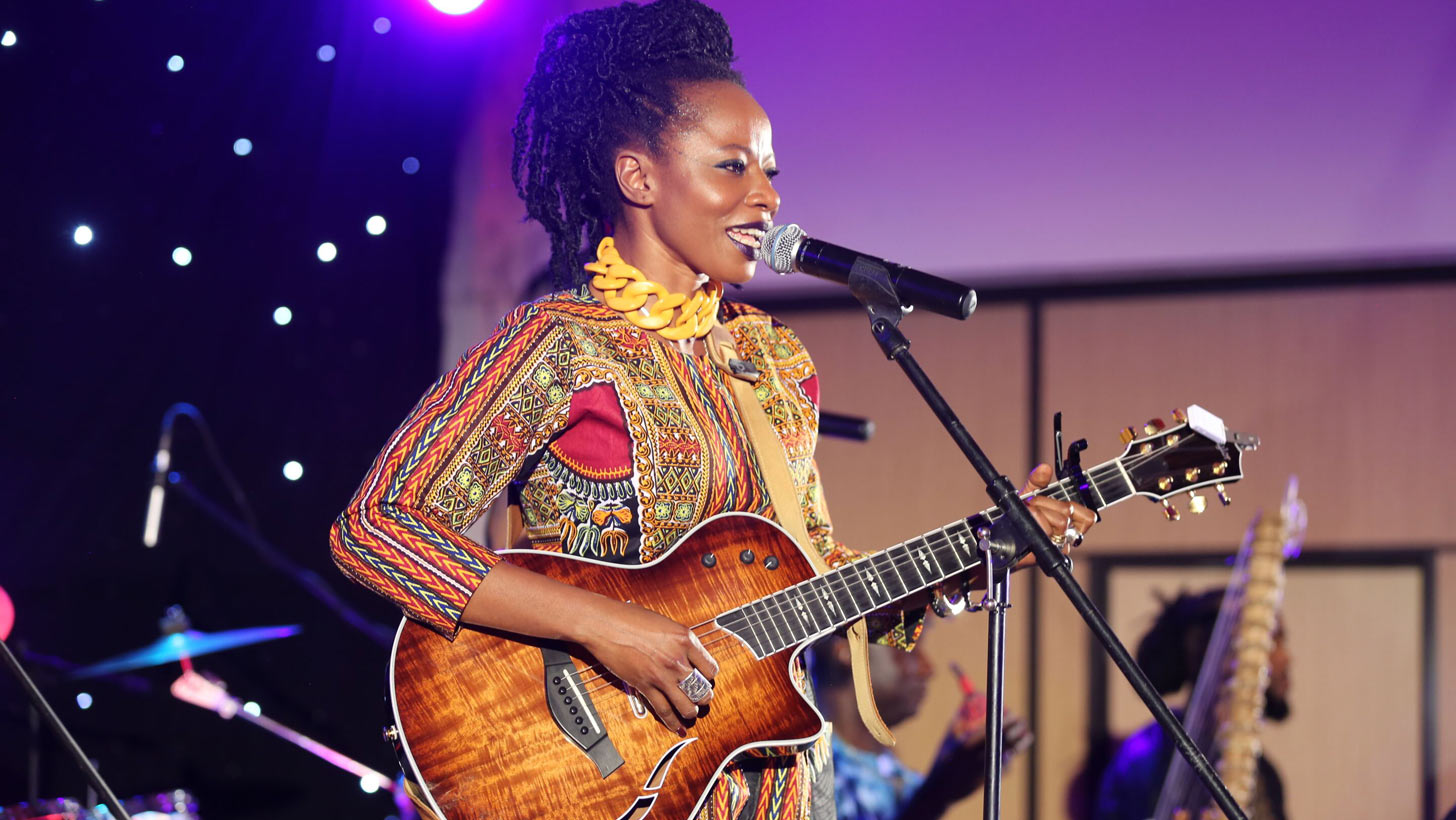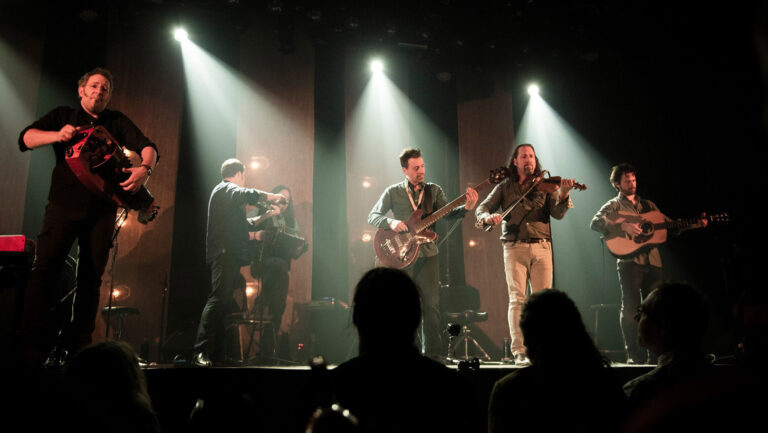The Vision of Frouge
To find our more about this 15th year celebration of ¡Globalquerque!, I sought out Tom Frouge. He’s the man who—with his company, Avokado Artists—came up with the global music festival we know and love today.Weekly Alibi: Tom, what’s going on with ¡Globalquerque! this year?Tom Frouge: It’s our 15th anniversary, that’s the big, obvious thing. But this year we have some very interesting, engaging acts coming in. But I want to say that one of the things about ¡Globalquerque! that is frustrating to us is that people’s perception of ¡Globalquerque! is not the reality of ¡Globalquerque!.How so? I think ¡Globalquerque! and I think of world music, global music—something similar to international art and music fest W.O.M.A.D., when that was the model for what world music could achieve.Yes, but that’s because you’re in tune; it is a W.O.M.A.D., very much so. However it’s hard to describe ¡Globalquerque! on paper or by talking about it, because there is so much going on. But I think the perception that people have, particularly among the fence sitters, is that ¡Globalquerque! is somehow a staid, ethnomusicological thing, right?Well, that appeals to people like me!So you understand that music has crossed borders for millennia, since the beginning [of human culture].It spreads like a virus.And not only does it cross physical, geographic borders, it also crosses sonic borders, genre borders—particularly in this postmodern age. So, as part of Globalquerque, we have a very traditional Chinese act. But then we have Dat Garcia from Argentina who takes folkloric Argentinian music and runs it through a bank of electronics.It seems like there’s an ascendant trend in world music now to mix a melting pot of influences, so that they come together and form new types of music, rich with texture and with diffuse influences.And the thing is, a band like theirs [Dat Garcia] or 47Soul from Palestine, are going to be the hippest acts within a 500-mile radius [of Albuquerque when they play]. Just because a band is from another country, is not from Europe or America doesn’t mean they aren’t contemporary. These are cutting-edge acts. They’re not your mother’s version of world music.Le Vent du Nord
Since I wanted to know more about these sea changing postmodern iterations of traditional folk music, I asked Tom to randomly pick a few of the artists performing at ¡Globalquerque! and ask them to kindly give me a bell. We’d talk about what it was they were up to, I told the visionary impresario.The first outfit to call me back was a dude named Olivier Demers. He was calling from somewhere in Quebec and plays fiddle in a band whose name translates as The North Wind.Weekly Alibi: Hello?Olikvier Demers: Yes, this is Olivier, the fiddler from Le Vent du Nord!The fiddler? Cool! Do you have a few minutes? Could you tell our readers about your music, your band and what they’re all about?It’s traditional music from Quebec. It’s based on folk music based on the actual instruments and methods originally used to make such music, like the hurdy-gurdy, accordion, foot-tapping, call and response and, of course, the fiddle, too. This music is a mix between our French roots, the French settlers and the later arrival—in the middle of the 19th century—of Scottish and Irish immigrants. We sing in French, but you may notice that some of the music is closer to Irish music. That style is very unique in Quebec.So all the music is performed acoustically on period instruments?Of course the show is amplified but it’s all based on acoustic instruments. The electric bass is one of the only modern instruments we use.Do you consider yourselves to be traditionalists or do you employ contemporary flourishes?That’s a very good question, because for us, we do use some very old traditional songs and tropes, but we also compose about half of the songs we perform and record. We see traditional music and folk music as a movement. We try to continue that, making the music grow and change in the process. So of course, our arrangements respect the roots of the music, the core is taken from the past. But the way we dress the music is quite modern. We try to position ourselves so that the tradition evolves. There’s total respect for what our elders did to transmit the passion of that expression to us.Natu Camara
While I was transcribing my conversation with Olivier, the phone rang again. It was Natu Camara, a Guinean rapper, rocker and soulful queen of cool, calling up to chat about—wait for it—¡Globalquerque!.Weekly Alibi: Hello.Natu Camara: Hello, is this August?Yes; Natu?Yes How are you!I’m great. Can we talk music?I’d love to have a conversation!Tell me about your music, your work. What would you like to tell our readers about yourself?I was born in Ivory Coast and I grew up in Guinea. I formed the first all-woman African hip-hop band, Ideal Black Girls.How did that happen?It was amazing. There were no women at all that were part of the scene, in that line of work. We made our first album in 2002 and our second came out in 2004. After that we got going in Paris and in New York. I live in New York City, but many of my friends still live in Paris. Now I’m playing solo, with a band backing me.Tell me more!I created the band here in New York City. We started to perform and then I produced an album called Dimedi.What’s your sound like? Is it groovy, polyrhythmic, influenced by your upbringing in West Africa?The sound is soul and Afro-rock. It’s two things, literally—water and fire. That’s what I call it because when I do soul, as a musician I play the guitar with deep feeling, I feel the soul of the guitar. It’s very intense, very emotional.Does that create tension in your music?August, I use every part of me and all of the knowledge I have and all the experiences from Africa to Europe to America—I put all of that into what I do. It’s really subtle, the new album. Very rich. We recorded it in Mali because I wanted to have an African basis for the whole of the record. So that’s who I am. I don’t like to use the term “world music,” it sets people off in a certain direction, looking for something specific. My sound is soul. It’s Afro-rock.How do you define Afro-rock?Imagine you have a rock and roll beat and an African beat. Put them together and you can dance to the intensity.More Than Music
In addition to offering two nights of most excellent musical experiences from all over the planet we call home, ¡Globalquerque! also has its share of daytime programming available to challenge your sense of place and encourage individual and ultimately global growth, too.• Free Global Fiesta: On Saturday, Sept. 21 from 10:30am until 4pm, Globalquerque hosts numerous educational workshops, activities and corollary performances including dance workshops hosted by Romy Keegan. Additionally, as a partner in the Global Week of Climate Action, Globalquerque will be hosting panels dealing with fracking in Chaco Canyon, songs of rebellion and the Global Climate Strike. Meanwhile in the Domenici Education Building, artist Lynnette Haozous will discuss her work. There will also be an International Food Preparation Demo and Tasting beginning at 1:30pm.• The theme of the 7th annual ¡Globalquerque! International Film Series theme is Immigration-Discrimination-Exploitation and it continues during the festival proper with the screening of two relevant films on Saturday, Sept. 21. The 2009 French film Le Concert screens at noon and The Jade Pendant, an example of Chinese cinema, circa 2017, screens at 2pm.• The Global Village—open on Friday, Sept. 20 from 4pm until close and Saturday, Sept. 21 from 10:30am until close—features 30 booths filled with crafts, culture and cuisine to expand the mind and enchant the senses. Craft vendors include Divine Nature Arts, Elevate Nepal, Jambo Imports, Laughing Hare Hot Glass and Namaste Crafts. Platero’s Fry Bread and Navajo Tacos and Nath’s Inspired Khmer Cuisine will also be on hand with hot and tasty eats for all the humans from every region on Earth.¡Globalquerque!
Friday, Sept. 20 through Saturday, Sept. 21National Hispanic Cultural Center • 701 Fourth Street SWVisit globalquerque.org for tickets and times










